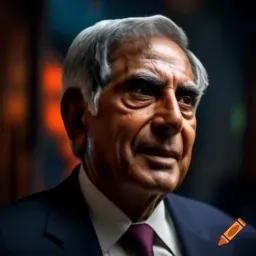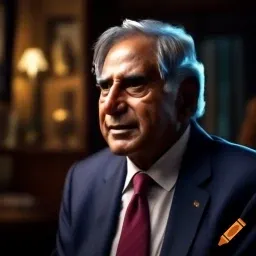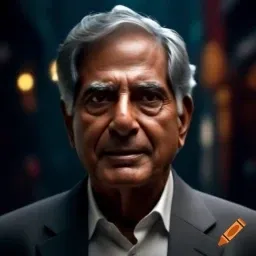Ratan Tata: The Educational Journey of a Visionary Leader
Updated: 11 June 2025, 4:34 pm IST
Summary
This blog explores the educational journey of Ratan Tata, highlighting how his academic background in India and abroad helped shape his visionary leadership. From Cornell University to Harvard, learn how his values, global exposure, and education laid the foundation for one of India’s most respected and admired business careers.
Ratan Tata, a former chairman of Tata Sons, is an Indian industrialist who led the Tata Group from 1990 to 2012 and also served as interim chairman from October 2016 to February 2017.
He is dedicated to philanthropy and is responsible for overseeing the company’s charitable trust, which allocates over half of its profits to various philanthropic initiatives.
In recognition of his contributions, he was awarded India's second and third-highest civilian honors – the Padma Bhushan in 2000 and the Padma Vibhushan in 2008.
Who is Mr. Ratan Tata?

Mr. Ratan Naval Tata is the son of Naval Tata, who was adopted by Ratanji Tata, the son of Jamsetji Tata, the founder of the Tata Group.
He received a bachelor's degree in architecture from Cornell University's College of Architecture.
When Ratan Tata joined the Tata Group in 1961, he started his career on the Tata Steel manufacturing floor.
After assuming the role of chairman at Tata Sons in 1991, he led the company to achieve extraordinary prosperity.
Highlights of Ratan TATA lives

| Name | Ratan Tata |
| Age / Date of Birth | 86 Years / (28 Dec 1987) |
| Education | bachelor's degree in architecture from Cornell University Harvard Business School |
| Family Background | Father:- Naval Tata Mother:- Sooni Commissariat |
| Occupation | Former Chairperson of Tata Sons and Tata Group Philanthropist Investor |
| Work title | Chairman Emeritus, Tata Sons and Tata Group |
| Top Awards | Padma Bhushan in 2000 Padma Vibhushan in 2008 |
| Networth | 3700 Cr |
Famous Quote of Ratan Tata | I don’t believe in making the right decisions. I take decisions and then make them right.”
“Power and wealth are not two of my main stakes. |
Inside the Life of Ratan Tata: From Childhood to Family Bonds

Ratan Tata was born on December 28, 1937, in Mumbai, into a Parsi Zoroastrian family. He is the son of Naval Tata, who was born in Surat and later adopted into the Tata family, and Sooni Tata, the niece of Jamsetji Tata, the founder of the Tata Group.
Tata’s biological grandfather, Hormusji Tata, was a blood relative of the Tata family.
When Tata was 10 years old, his parents separated in 1948, and he was raised by his grandmother, Navajbai Tata, the widow of Ratanji Tata, who adopted him.
Ratan Tata has a younger brother, Jimmy Tata, and a half-brother, Noel Tata, from Naval Tata’s second marriage to Simone Tata.
Ratan grew up mostly in India, under the care of his maternal grandmother after his parents' divorce.
In a post on Humans of Bombay, he revealed that he fell in love and almost got married while living in Los Angeles.
The Educational Journey of a Visionary Leader Ratan Tata

In 1962 Ratan Tata started working on the shop floor at Tata Sons. Notwithstanding the difficulties, he was able to obtain practical experience and received insightful knowledge about the family firm from this position.
In 1971, Ratan Tata was appointed Director-in-charge of NELCO (National Radio and Electronics Company Ltd.), which was in financial distress at the time.
He worked hard to revitalize the company’s consumer electronics division, but despite his efforts, economic recession and union challenges hindered its success.
Ratan Tata was transferred to Empress Mills, another struggling Tata Group company, in 1977.
He developed a plan to revitalize the mill, but senior management rejected it, which ultimately led to the company's closure. He was thereafter transferred to Tata Industries.
JRD Tata appointed Ratan Tata Chairman of the Tata Group in 1991. Upon first hearing of his hire, a few executives complained, questioning his ability to handle the massive responsibilities.
However, Ratan Tata immediately showed his mettle as CEO by increasing shareholder dividends, updating the management, and improving the profitability of the business.
He also held positions on the Prime Minister's Council on Trade and Industry and the Asia Pacific Policy Advisory Board of RAND Corporation during this time.
Ratan Tata has also been involved in India's AIDS initiative and has held prestigious positions on the international advisory boards of Mitsubishi Corporation, JP Morgan Chase, Booz Allen Hamilton, and the American International Group.
On his 75th birthday in December 2012, Ratan Tata retired as chairman of the Tata Group, and Cyrus Mistry, the Managing Director of Shapoorji Pallonji Group, succeeded him. Ratan Tata later returned as interim chairman from October 2016 to February 2017.
Ratan Tata continued to be involved in business and humanitarian initiatives after he retired, and his efforts have had a profound effect on numerous Indian industries.
Key Achievements of Ratan Tata

Under the leadership of Ratan Tata, the Tata Group gained global recognition. He guided the Tata Group to remarkable financial prosperity and played a key role in making it the first Indian company to be listed on the New York Stock Exchange.
He led important acquisitions that facilitated the global expansion of the Tata Group, including the acquisition of Corus, Jaguar Land Rover, and Tetley.
Additionally, he spearheaded the creation of innovative automobiles such as the Tata Nano and Tata Indica.
As a dedicated philanthropist, Ratan Tata has allocated over 65 percent of his wealth to charitable trusts. His lifelong goal has been to enhance the quality of life for Indians and promote human development across the nation.
Ratan Tata’s Philanthropic Contributions

Ratan Tata had a key role in establishing the Sir Dorabji Tata Trust, which carried out his father's goal. He has given between 60 and 65 percent of his income to various philanthropic causes. His charitable endeavors are extensive and have a significant impact, particularly in the areas that are included.
Education-Related Contributions
Jamsetji Tata, the founder of the Tata Group, left a legacy that Ratan Tata carried on. Scholarships for postgraduate study are available to Indian students from the JN Tata Endowment for Higher Education. Under his direction, TATA Trusts has concentrated on addressing issues in the field of education, especially expanding underprivileged children's access to high-quality education. Their programs aim to encourage the use of technology in the classroom, develop problem-solving skills, foster cooperative learning, and promote critical thinking. Aligned with their work are the Sustainable Development Goals (SDGs) of the UN.
Quality Education (SDG 4)
Gender Equality (SDG 5)
Decent Work and Economic Growth (SDG 8)
Industry, Innovation, and Infrastructure (SDG 9)
Reduced Inequality (SDG 10)
Partnerships to achieve the SDGs (SDG 17)**
Several prominent educational institutions have been established or supported by TATA Trusts in both India and abroad under Ratan Tata’s leadership, including:
Tata Centre for Technology and Design at IIT Bombay
Tata Centre for Technology and Design at MIT and the University of Chicago
Tata Centre for Genetics and Society at UC San Diego
Harvard University South Asia Institute
Indian Institute of Science (IISc), Bengaluru
Tata Institute of Social Sciences (TISS), Mumbai
Tata Memorial Centre, Mumbai
Tata Institute of Fundamental Research (TIFR), Mumbai
National Institute of Advanced Studies (NIAS), Bengaluru
The Tata Education and Development Trust also established a $28 million Tata Fundraising Campaign in collaboration with Cornell University to provide financial aid to Indian undergraduate students who cannot afford higher education costs.
Contributions to Healthcare
Ratan Tata has significantly contributed to improving primary healthcare in India, particularly focusing on maternal health, child health, and mental health, and combating diseases like cancer, malaria, and tuberculosis.
He also granted ₹750 million to the Centre of Neuroscience at the Indian Institute of Science for Alzheimer’s disease research. His initiatives, in collaboration with governments, NGOs, and other partners, aim to improve maternal care, nutrition, water, sanitation, and healthcare infrastructure.
Contributions to Rural and Agricultural Development
The Tata Group’s Transforming Rural India Initiative (TRI) works with governments, NGOs, civil society groups, and philanthropists to transform poverty-stricken rural areas. In addition, Ratan Tata has made a substantial contribution to the construction of hospitals and schools in rural areas as well as substantial support during natural disasters.
Know More About Our Online Programs
Sir Ratan Tata Trust

Founded by Ratan Tata in 1919, the Sir Ratan Tata Trust focuses on improving the well-being of the underprivileged across various sectors. The trust offers two different kinds of grants:
Institutional awards: Small, program, and endowment awards are among them.
Emergency Grants: Provided in times of emergency or catastrophe.
In addition, Ratan Tata is the chairman of the Sir Dorabji Tata and Allied Trusts and owns 66 percent of Tata Sons.
Other Initiatives by Ratan Tata

Ratan Tata has had executive roles in many domestic and international businesses. He is a member of the boards of Mondelez International, Alcoa Inc., and the East-West Centre.
He is also associated with the following organizations: the advisory boards of Cornell University, the University of Southern California Board of Trustees; the advisory board of the dean of Harvard Business School; and the international advisory board of Bocconi University.
In February 2015, he started working as an advisor for the venture capital firm Kalaari Capital, having been appointed to the Carnegie Endowment for International Peace board in 2013.
Retirement and Current Engagements
Ratan Tata retired as Tata Group chairman on December 28, 2012, at the age of 75, and Cyrus Mistry took over. Following a board dispute, Mistry was ousted in 2016, and Ratan Tata returned as interim chairman. In January 2017, Natarajan Chandrasekharan was named chairman of Tata Group.
At present, Ratan Tata continues to oversee both Tata Trusts and Tata Sons, making him the second person, after JRD Tata, to lead both companies.
Challenges Faced by Ratan Tata

Ratan Tata encountered several challenges throughout his career. In 1977, he was forced to close Empress Mills due to the core management’s refusal to approve a ₹50 lakh investment for the unit’s revival, a project that was close to his heart. This failure left him deeply discouraged.
In 1981, upon being named the successor of Tata Group by JRD Tata, he encountered widespread doubt from the public, Tata Group employees, investors, and shareholders regarding his capability.
When he first entered the car market in 1998 with the Tata Indica, the car was a flop, which made him consider selling the company. When Ratan Tata tried to sell Ford Motors Tata's automotive division in 1999, Ford officials treated him rudely and asked him why he had entered the market without having any experience with passenger cars.
In 2008, Ratan Tata managed to purchase Jaguar-Land Rover from Ford for ₹2,500 crore, thereby rescuing the company from bankruptcy.
Call Us For Any Query:- 1800 102 3434
Ratan Tata - Top Awards and Achievements

The Indian government bestowed the third-highest civilian honor, the Padma Bhushan, upon her in 2000.
In 2004, he was honored with the Medal of the Oriental Republic of Uruguay by the Uruguayan government.
In 2007, London School of Economics and Political Science.
In 2008, he was conferred the Padma Vibhushan, the second-highest civilian honor from the Indian government.
In 2009, he was recognized as a Grand Officer of the Order of Merit of the Italian Republic by the Italian government.
Conclusion
Ratan Tata’s career and life journey provides valuable insights for anyone looking to create a positive impact in the world. His dedication to excellence, innovation, and adaptability have played a crucial role in the success of the Tata Group. Furthermore, his commitment to ethical leadership and corporate social responsibility has garnered him widespread respect and admiration.
Tata's focus on teamwork and sustainability, combined with his compassion and willingness to lead by example, serves as an inspiring model for all. These lessons are not only pertinent for business leaders but also for anyone aspiring to make a meaningful difference in the world.

